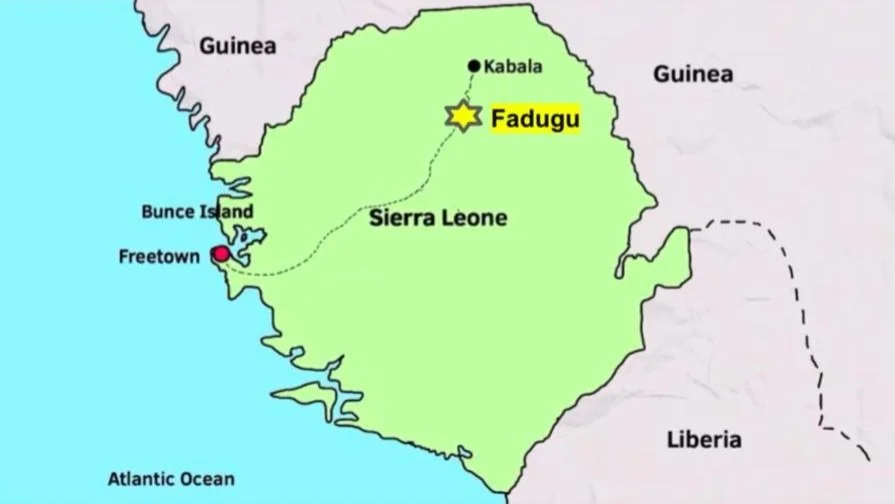Fadugu’s Alharrkan School
Students from the smaller nearby villages of Kafogo, Kamabinki and Sangbaba come to Fadugu to attend the Alharrkan School.
In the 2020-21 academic year, a total of 27 students were promoted to class 6, with 20 of those students continuing their education in junior secondary school; Eight (8) students went to LOMA secondary school in Kabala, and twelve (12) students went to Ahmadiyya Muslim Agriculture Secondary School in Kabala.
The Alharrkan Primary School is located in the village of Fadugu about 25 miles from Kabala in Northern Province of Sierra Leone. Around 1,500 people live in Fadugu. The Alharrkan Primary School enrolls around 280 students in Class 1-6 (Grades 1-6).
-
Similar to the economy of Kabala, Fadugu is also supported on basic agriculture and livestock. With a strong concentration on rice, individuals also work the land to grow crops like yams, maze, and other vegetables. Children are often called from school to help tend to the farm when needed, restricting some children from attend school completely. The area also produces honey and milk from the cattle farms.
-
The town is off the power grid, so all electricity is supplied through small diesel generators or solar panels.
Kabala has 3 public water wells in the entire community, where villagers obtain their daily water.
-
Cellular connection is poor on the outskirts of Fadugu, however locals can purchase 3G data if need. This is unreasonable for the majority of individuals. For most, internet is only available by traveling to Kabala’s Cometech facility.
-
The town chief of Fadugu is Kemo Kamara, an education-minded man who supports the Alharrkan School. Kemo holds high aspirations for the advancement of his village through education.
-
There is no western medical doctor in Fadugu, but like most villages, Fadugu has a health center that is managed by a Community Health Worker. Many locals who practice a mix of traditional and western medicine are also available.
Life in Fadugu
World Possible’s Program
-
The World Possible Learning Program in Fadugu established the solar infrastructure and present tablets from a program originally set up by CAUSE Canada in 2016. After the funding and programs ceased, World Possible - Sierra Leone was able to revive portions of the infrastructure left by CAUSE Canada to establish the current program.
-
The Fadugu World Possible Program is housed in a room in the Alharkan School. The facility is powered by a 50 watt solar panel with a 90 amp hour battery bank. Students can work on 15 Samsung tablets at a time. The tablets are connected to one RACHEL (RACHEL-Plus 1.0), which serves Khan Academy and other educational content.
-
The leader of the World Possible - Sierra Leone Program in Fadugu is Mr. Umar A. Conteh. He oversees daily learning sessions with an emphasis on mathematics. Mr. Conteh is a volunteer community teacher. Like most community teachers, he was unable to continue his early education due to lack of financial support. Community teachers are not trained in teaching but posses a strong passion promote their community’s education.
-
Since the beginning efforts with the Cause Canada Program, the Alharakan’s Mother’s club has supported World Possible- Sierra Leone for over 5 years now. The members provide monthly contributions of 10,000 Leones per -member just to support vulnerable children with learning materials like book, pencils, bags, and clothing.
The Mother’s club also uses part of their contributions as a revolving loan among themselves. The interest generated is sometimes used to support vulnerable children in school along with maintaining the school’s supplies.
-
We have only partially resuscitated this Village Learning Center. We need some help finishing the job.
The center is using a RACHEL 1.0. We would like to upgrade to the much more powerful RACHEL 4.0. Among many upgrades, RACHEL 4.0 will bring much more powerful student tracking capabilities to our program. We believe we have found a donor for this upgrade and hope to install it this summer or before.
What we really need is new tablets. The 15 original tablets are more than six years old. Batteries are failing and need to be frequently recharged. Many units have completely failed. We want to integrate our program into the full school day and run the learning center all day long and expand the curriculum to reading. Before we can do that, we need to buy 30 new tablets. We need enough tablets for a full Math and English class. If we can run 30 tablets all day long, that increases the number of tablet hours by a factor of five or more. That in turn, will increase student learning and measured performance in math and also allow us to expand the program from math only to math and reading.
Can you help us with $3000 to upgrade Fandugu’s Alharrkan School tablets.
This upgrade will also require upgrading the solar system, but we believe we have found a donor for that.


